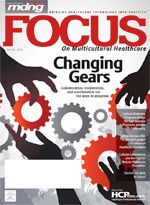Publication
Article
FOCUS Multicultural Healthcare
Collaborations that are Making a Difference in the Fight to Eliminate Disparities in Health and Healthcare
Author(s):
With the election of a new administration in Washington, a dialogue about transforming our healthcare system is beginning.
The winds of change are blowing. With the election of a new administration in Washington, a national dialogue about transforming our healthcare system is beginning.
In the coming months, we will again see serious discussions taking place about a host of important issues of concern to practicing physicians and their patients. These include: reducing the number of people who are uninsured; improving access to care for all; healthcare financing and insurance reform; the development of patient-centered medical homes; support for implementing electronic health records and other information technologies; and improving patient safety and quality of care, to name just a few.
It is also likely we will see greater attention paid to major initiatives related to 1) eliminating racial and ethnic disparities in health and healthcare; and 2) providing culturally and linguistically appropriate care to our increasingly diverse population, especially in light of recently proposed new standards by the National Quality Forum, the National Committee for Quality Assurance, and the Joint Commission.
In order for the above efforts to bear fruit, it will be important for physicians, allied healthcare professionals, and other interested stakeholders and constituencies to join forces and work together through the development of effective consortiums, coalitions, commissions, alliances, partnerships, and other “learning and action communities.” All too often, we unfortunately find ourselves “siloed” from each other in our busy lives. This can result in isolation, frustration, and despair about the lack of control and meaning in our professional work.
This issue focuses on several inspiring examples of successful collaborations that are starting to make a real difference. The American Medical Association Minority Affairs Consortium and Commission to End Healthcare Disparities’ Doctors Back To School Program recruits physicians to visit inner-city schools and other low-income areas in order to attract, recruit, and mentor those students.
The Camden Coalition of Healthcare Providers in New Jersey, the brainchild of Dr. Jeffrey Brenner, a busy practicing family physician and advocate par excellence, is working to repair Camden’s “broken” healthcare system and to provide more cost-effective, coordinated, and patientcentered care to patients with multiple complex medical and psychosocial problems.
The Georgetown National Center for Cultural Competence has been in the forefront of developing and facilitating a host of important cultural competency efforts and resources, including cultural brokering programs, for health and mental healthcare organizations, policy makers, administrators, clinicians, and community agencies. An interview with the Center’s director, Tawara D. Goode, MA, provides valuable insights into where the cultural competency field is evolving, how it interfaces with physician education, and efforts underway to reduce healthcare disparities.
Along with these initiatives, the growth of interest in social networking, blogs, wikis, and other Web 2.0 collaboration platforms will likely lead to the development of more websites devoted to health disparities, cultural competency, and related topics. Indeed, the Health Disparities blog at Case Western Reserve University is an example of such a site and is well worth visiting.
We hope that MDNG: Focus on Multicultural Healthcare will also serve as a place where an online virtual community of interested individuals can come together and discuss the many important topics covered in this publication. I look forward to continuing our journey together!
Thank you for reading.
Robert C. Like, MD, MS
Professor and Director
Center for Healthy Families and Cultural Diversity
Department of Family Medicine
UMDNJ-Robert Wood Johnson Medical School
New Brunswick, NJ





